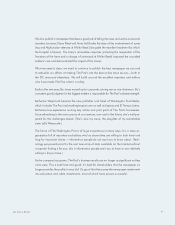Washington Post 2007 Annual Report Download - page 20
Download and view the complete annual report
Please find page 20 of the 2007 Washington Post annual report below. You can navigate through the pages in the report by either clicking on the pages listed below, or by using the keyword search tool below to find specific information within the annual report.Holborn’s students come from outside the United Kingdom and the European Union. At year-end 2007, Holborn was
providing courses to approximately 2,100 students.
Kaplan Law School
In 2007, Kaplan began operating Kaplan Law School in London in collaboration with Nottingham Trent University’s
Nottingham Law School. Kaplan Law School provides graduate diploma, legal practice and bar vocational training
for U.K. university graduates wishing to progress into the U.K. legal profession.
Student Visas for Study in the U.S.
One of the ways a foreign national wishing to enter the United States to study may do so is to obtain an F-1 student visa.
For many years, most of Kaplan’s Test Prep and Admissions centers in the United States have been authorized by what is
now the U.S. Citizenship and Immigration Services (the “USCIS”) to issue certificates of eligibility to prospective
students to assist them in applying for F-1 visas through a U.S. Embassy or Consulate. Under an administrative program
that became effective early in 2003, educational institutions are required to report electronically to the USCIS
specified enrollment, departure and other information about the F-1 students to whom they have issued certificates of
eligibility. Kaplan has certified 138 of its U.S. Test Prep and Admissions centers to participate in this program, and
Kaplan Aspect has 7 locations certified to participate in this program. During 2007 students holding F-1 visas
accounted for approximately 3.8% of the enrollment at Kaplan’s Test Prep and Admissions centers and an insignificant
number of students at Kaplan’s Higher Education programs. Kaplan Aspect is also a Designated Sponsor for the
U.S. Department of State’s Summer Work & Travel Program. This cultural exchange program is designed to allow
international college or university students to come to the U.S.onaJ-1visatofilltemporary,paidpositionsduringtheir
summer break. In 2007, Kaplan Aspect sponsored approximately 1,700 international students on a J-1 visa to
participate in the exchange visitor program.
Title IV Federal Student Financial Aid Programs
Funds provided under the student financial aid programs that have been created under Title IV of the Federal Higher
Education Act of 1965, as amended, historically have been responsible for a majority of the net revenues of Kaplan
Higher Education. During 2007, funds received under the Title IV programs accounted for approximately $745 mil-
lion, or approximately 73%, of total Kaplan Higher Education revenues. The Company estimates that funds received
from students borrowing under private loan programs comprised approximately an additional 9% of its higher
education revenues. Direct student payments and funds received under various state and agency grant programs
accounted for most of the remainder of 2007 higher education revenues. The significant role of Title IV funding in the
operations of Kaplan Higher Education is expected to continue.
Title IV programs encompass various forms of student loans, with the funds being provided either by the federal
government itself or by private financial institutions with a federal guaranty protecting the institutions against the risk of
default. In some cases the federal government pays part of the interest expense. Other Title IV programs offer non-
repayable grants. Subsidized loans and grants are only available to students who can demonstrate financial need.
During 2007, approximately 73% of the approximately $745 million of Title IV funds received by Kaplan Higher
Education came from student loans and approximately 27% of such funds came from grants.
To maintain Title IV eligibility, a school must comply with extensive statutory and regulatory requirements relating to its
financial aid management, educational programs, financial strength, recruiting practices and various other matters.
Among other things, the school must be licensed or otherwise authorized to offer its educational programs by the
appropriate governmental body in the state or states in which it is located, be accredited by an accrediting agency
recognized by the U.S. Department of Education (the “Department of Education”) and enter into a program partic-
ipation agreement with the Department of Education.
A school may lose its eligibility to participate in Title IV programs if student defaults on the repayment of Title IV loans
exceed specified default rates (referred to as “cohort default rates”). A school whose cohort default rate exceeds 40%
for any single year may have its eligibility to participate in Title IV programs limited, suspended or terminated at the
discretion of the Department of Education. A school whose cohort default rate equals or exceeds 25% for three
consecutive years will automatically lose its Title IV eligibility for at least two years unless the school can demonstrate
exceptional circumstances justifying its continued eligibility. Pursuant to another program requirement, any for-profit
post-secondary institution (a category that includes all of the schools in Kaplan’s Higher Education Division) will lose its
Title IV eligibility for at least one year if more than 90% of that institution’s receipts for any fiscal year are derived from
Title IV programs.
4THE WASHINGTON POST COMPANY
























